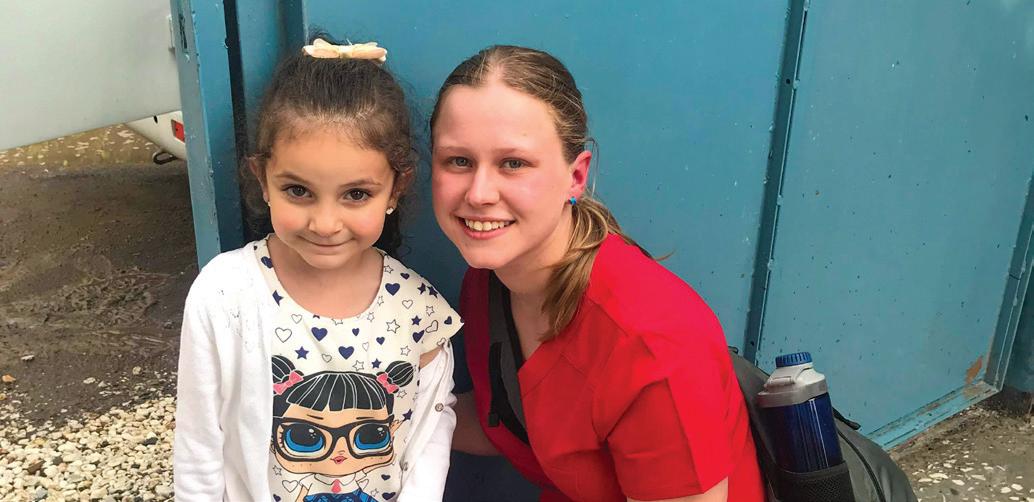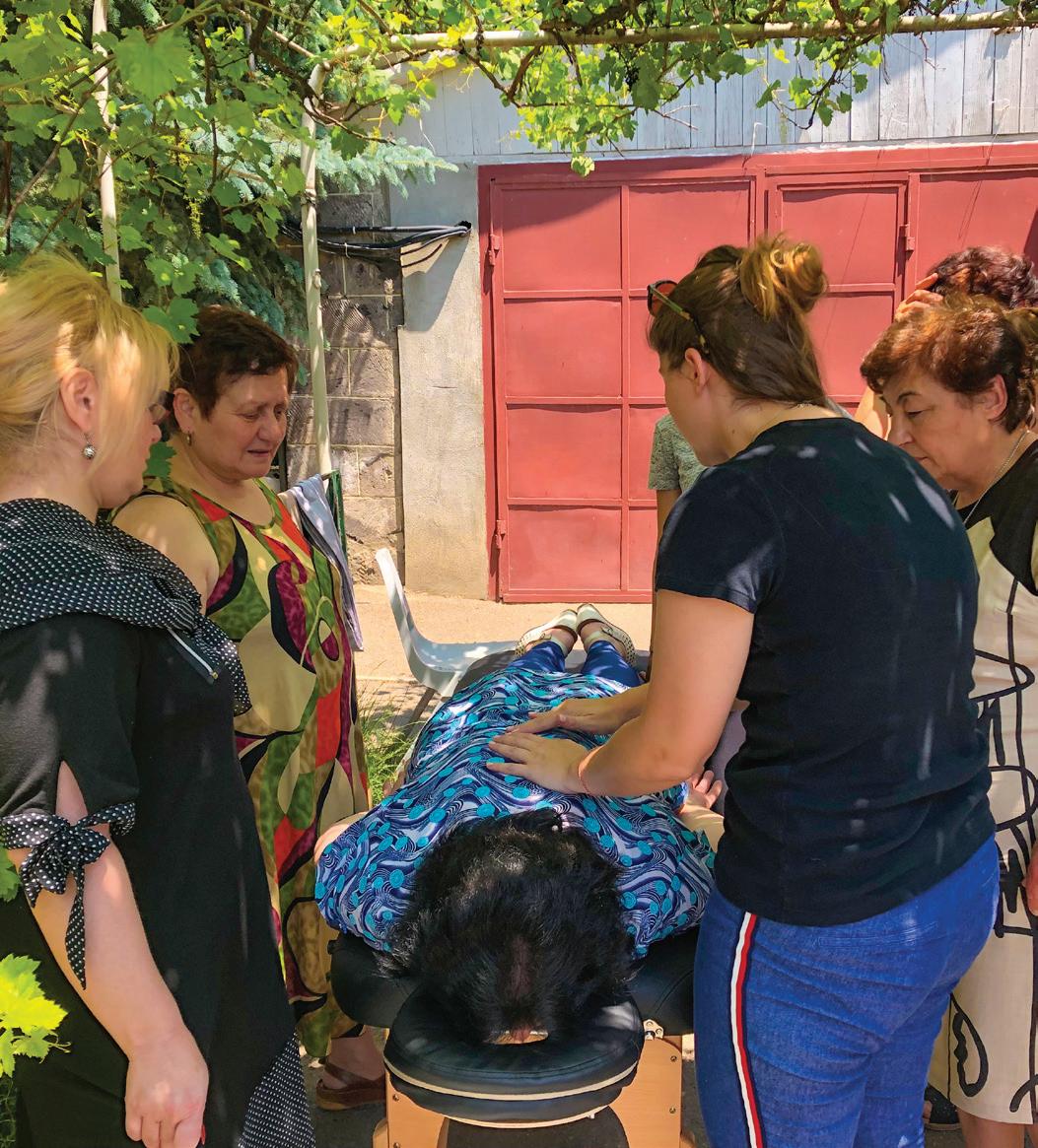
9 minute read
Armenia - A Call to Serve
Armenia A Call to Serve

Advertisement
In June, a small team of six medical students and two pharmacy students, along with three faculty members – two physicians and a pharmacist – participated in partnership with the North Carolina Baptist Men (NCBM) in a medical outreach trip to Armenia, led by Dr. Victoria Kaprielian.
"The NC Baptist Men have been going to Armenia for years," said Kaprielian, "and they were the ones who first took me to Armenia."

Dr. Kaprielian is an ethnic Armenian, and her grandparents were refugees during World War I. Because Armenia was part of the Soviet Union for 70 years, her parents were never able to travel there.
Armenia was a Soviet Republic from 1920 to 1991, and its major industry was munitions manufacturing. They were one of the best producers of weapons for the Soviet Union. When the Soviet Union broke apart, not only did the Russians leave, they took all the manufacturing equipment with them, leaving behind empty factories and lack of employment opportunities.
This situation coupled with a blockade on two sides by hostile nations led to a major economic collapse in the 1990s, from which Armenia is still recovering.
Armenia also suffered a major earthquake in 1988, and there are people still living in temporary shelters, which were supposed to last for six months. Now, 30 years later, many are still living in tin boxes. There's very high unemployment and a lot of need throughout the country.
"It was a very touching experience on a lot of levels for me," she shared. "But the students who go gain exposure to a different culture, while getting to serve people who are underserved."
Culture, Medicine & Clinical Experience
According to the Joshua Project, there are over 17,000 people groups in the world. These groups all differ in language, customs, traditions, and a general way of life. They each have their own unique cultural, religious, and political history that has shaped who they are today as a people.
In preparation for the medical outreach trip to Armenia, the team spent time reading and studying the history of Armenia. They had the opportunity to visit the Armenian Genocide Memorial and Museum in Yerevan, the capital city, on their first day in the country. This allowed them to gain perspective and insight as they served the Armenian communities.
"Some of the history is still so relevant in their lives," said Andrew James, MSII. "[Having] that knowledge in a clinical setting [helped us] realize what they've gone through and how their culture and history has an impact on them, even on their health."
The students and faculty serve in partnership with the Armenian Baptist Christians through the North Carolina Baptist Men. They set up clinics in their churches and homes to treat patients, really focusing on the clinical skills they learned throughout their first year of medical school.
"I got to hone a lot of the clinical skills that we have now," said Gabe Brotzman, MSII. "It's nice to have some of the technique down and just looking at a lot of eyes, noses and listening to a lot of hearts and lungs was really helpful."

Brotzman further shared how the trip helped him to see in a broad way that people are essentially "the same" wherever you go. There are certainly different cultures, foods, beliefs, etc., but there are humanistic traits that bring individuals together. All people are passionate, driven and motivated by something.
"[It's important] to start identifying those [things] and seeing how they're the same," said Brotzman, "and that you can connect with people on a really deep human level anywhere you go, even halfway around the world … I think some are really powerful things you can connect with people on as a healthcare provider."
JJ Simmons-Josilevich, MSII, shared a similar experience and how the relational aspects of patient care in Armenia increased her passion for clinical experience here at home.
"I've worked in the [Community Care] clinic," said Simmons Josilevich, "but now I'm going to be in the clinic every Tuesday night for the entirety of this block just because I enjoyed interacting with [the Armenian] patients so much."
She went on to explain how clinical experience can help students learn specific medical skills while shifting the brain to a more relationally focused mentality.
"I think it's one way when you're in the books as this kind of [academic] flow," Simmons-Josilevich remarked, "but it's completely different when you get outside [of the classroom] and you're trying to make differentials and have a conversation with the patient."

The number of clinics held and patients treated continues to grow year after year. The team saw 50% more patients in 2018 than in 2017, and that number increased again this year by 40%. The outreach team also continues to grow with the addition of a pharmacy student and faculty member both last year and this year.
"As a pharmacy student, I was able to have more opportunities and was pushed outside my comfort zone," said Savanna Scott, P3. "In school, they teach us a lot about interacting with [healthcare] providers and the right language to use, and even part of our OSCE is communicating with the providers. We don't get that a lot in the classroom, so it was really helpful."
Andrew James, MSII, also shared the importance and value of working as a team and fully understanding and appreciating the interdisciplinary aspect of healthcare.
"It's a very integrated system and you need to rely on everyone to have a healthcare outcome that's good for everyone," said James. "And this was just the first insight of how critical [every role] is to having a good well-oiled healthcare machine."

Serving the Rural & Underserved Halfway Around the World

According to the Armenian Government, Armenians have access to primary care. However, because of poverty and high unemployment, the majority of Armenians cannot afford healthcare.
"I'm interested in doing rural medicine," said Amy Medford, MSII. "I think it was a good experience for me to see what it's like when you have limited resources."
The typical first line of treatment and the newest drugs available are not a realistic option for patients in these areas, so physicians have to look at sustainable treatment and care options.
"It's a problem-solving kind of process [that involves] working with the patients to see what's going to work best for them and their lifestyle. I think it was really [helpful] to see that, especially with the limited resources that we had [available in Armenia]," shared Medford.
As with many rural and underserved populations in the United States and around the world, there is an overall lack of health education in Armenia. Unfortunately, this results in people self-diagnosing problems and treating them in ways that are not very helpful. On this particular trip, the team encountered many misconceptions about hypertension.
"We try to educate them," said Dr. Kaprielian. "We give them a month or two supply of medicine, but we try to help them understand this is not a cure, this is something that controls the problem, and they have to continue taking the medicine."
One of the many reasons that patients continue to return to the clinics is that they genuinely appreciate the time that the students and faculty spend examining and talking with them. Many of them suffer from musculoskeletal pain, so they really benefit from osteopathic manipulation.

Dr. Kaprielian shared a memorable story of a woman that came to the clinic with a frozen shoulder, and she couldn't lift her arm more than about 45 degrees.
"We did some Spencer technique on her shoulder and retested her," she said. "We watched her face as she lifted her arm and she was looking at us like, Wait a minute - Wow! Is this really happening!?"
It's often said that working with and caring for underserved populations puts things into perspective – that certainly appears to be the case for this medical outreach team. JJ Simmons-Josilevich, MSII, shared an experience where she wasn't with the patient directly but seeing the patient's reaction left an impression on her not soon to be forgotten.
"I remember her coming in and she had burns on her face and her hands," said Simmons-Josilevich. "When she left she was holding sunscreen, and I was [thinking] how I complain about sunscreen being $10. But when she came out, just [knowing] the impact of that sunscreen – what it had on her face and how she clenched it and just her reactions as they were getting her vitals … it put a lot of things in perspective – not just the clinical medicine side of it, but the humanistic side of it."
Responding to the Call

This was the 5th trip Dr. Kaprielian has led to Armenia with the NC Baptist Men, and Paul Langston, missions mobilization consultant with the NCBM, says they keep getting better and better each year. He was in Armenia for a few weeks this past summer before the team's arrival.
"You've just captured people's hearts, and they're so excited," said Langston. "They couldn't wait to have you come – it makes them not feel forgotten. They were a second class part of the Soviet empire, so there's a long history of feeling they're brushed aside. You've undergirded them and they've been excited and already can't wait for you to come back."
Medical outreach is a valuable expansion of the horizons for students. Serving and spending time with communities and people from other cultures and backgrounds, especially for the first time, is an invaluable experience and opens your eyes to a whole new world.
"Certain things just transcend language," said Amy Medford, MSII. "Like a smile, a hug, a friendly face – and even music. When we were at the church service and the graduation – everyone could sit there and enjoy the music even if we didn't know exactly what they were saying – and that was a really special moment."
Pursuing medicine is not always an easy journey. It takes commitment, hard work, and determination. And perhaps above all, it takes passion. Passion for people, passion for service, and passion for learning. Passion drives us to go and do, which often helps us see and understand.
"I think the biggest thing that I got from the trip was an affirmation that this is what I want to do for the rest of my life," said Brittany Williams, MSII. "We sit in a lecture hall for hours and hours every single day, and it kind of gets hard to realize that it's going to go somewhere. I knew that medicine was something that I wanted to do and implement missions into that, so this was just 100% validation that I'm on the right path and this is truly what I'm meant to do."
— SHELLEY HOBBS
2019 Armenia Medical Outreach Team Members
STUDENTS Gabe Brotzman, MSII; Andrew James, MSII; Amy Medford, MSII; Lina Poindexter, P4; Savanna Scott, P3; JJ Simmons-Josilevich, MSII; Jennifer Stoltenberg, MSII; Brittany Williams, MSII
FACULTY MEMBERS Dr. Victoria Kaprielian School of Medicine; Dr. Charlotte Paolini School of Medicine; Dr. Asima Ali College of Pharmacy & Health Sciences
NC BAPTIST MEN Paul Langston







